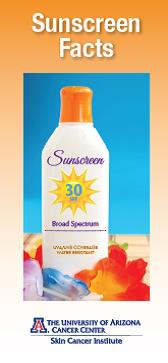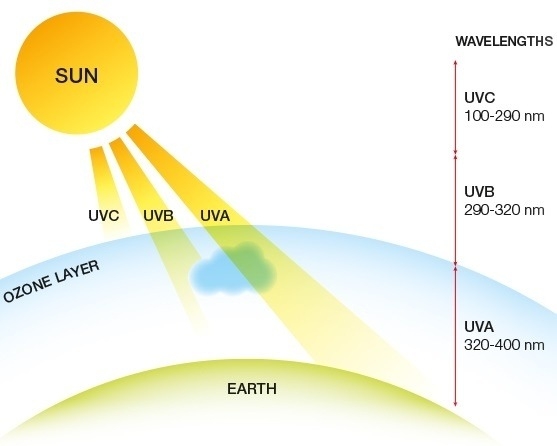Sunscreen helps protect your skin from ultraviolet radiation (UVR) from the sun.
There are three types of UVR given off by the sun:
- UVA rays go deep into skin to cause damage like wrinkles, sagging and tanning. UVA rays pass through window glass. Tanning booths emit primarily UVA rays.
- UVB rays are shorter and stronger than UVA. UVB rays burn the top layers of the skin.
- UVC rays are strongest and most dangerous. Luckily, the ozone layer keeps them from reaching earth.
Choosing and using sun protection products
 Look at the SPF
Look at the SPF
Sunscreen products contain active ingredients that absorb into your skin to provide sun protection within the skin layers. The Sun Protection Factor (SPF) number on the product label tells you how long the product will protect your skin from the burning UVB rays. Use a sunscreen with a SPF of 30 or higher.
Broad spectrum products are best
These products have ingredients that block or absorb both harmful UVA and UVB rays from ever penetrating your skin. Use products that contain one of the following to get broad spectrum protection:
- Zinc oxide: Inorganic, physical UV blocker
- Titanium dioxide: Inorganic, physical UV blocker
- Avobenzone: Organic, UV absorber
- Mexoryl: Organic, UV absorber
Is it water resistant?
Sun protection products may be labeled “water resistant”. These must still be reapplied every 40-80 minutes if you have been in water, or sweating.
Sun protection products may be labeled “water resistant”. These must still be reapplied every 40-80 minutes if you have been in water, or sweating.
The expiration date matters!
Be sure to buy products that won't expire before you can use them up. Store sunscreen in a cool, dark place. When sunscreen gets too warm, it becomes less effective.
Tips for using sun protection products
- Use one ounce (1 oz.) – about the size of a golf ball – to protect the average adult.
- Apply products 20-30 minutes before going outside.
- Don’t forget to apply products to your ears, neck, scalp, hands and feet.
- Apply a lip balm with SPF to your lips.
- Reapply products every 2 hours.
- Don’t forget to protect your eyes. Wear sunglasses with 100 percent protection from UVA/UVB rays.
Related resources
- Click here for tips on how to get the most out of your sunscreen.
- Not a big fan of sunscreen, click here for some solutions to the most common sunscreen concerns.



